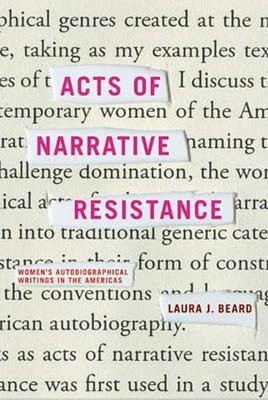Acts of Narrative Resistance: Women's Autobiographical Writings in the Americas

Laura Beard’s study of women’s autobiography in its many forms, Acts of Narrative Resistance, is quite unique. There has to my knowledge never been a thorough single author study written which connected and compared such a variety of autobiographical texts from the Americas in Spanish, Portuguese, and English. Beard’s study focuses on women’s autobiography in Argentina, Brazil, and what she calls Indigenous Canada (some would argue that the term “Indigenous” in her appellation is superfluous, but we won’t get into that thorny discussion).
Many studies have been published on these genres in those individual countries, studies which have also pointed out some of the central themes brought forth by Beard concerning the difficulties and challenges associated with studying autobiography and its associated forms. All these topics are well summed up by Beard in her analysis, in which she identifies these narratives “as autobiographical fiction, fictional autobiography, autobiographical novels, semi-autobiographical novels, memoirs, and testimonios.” “Testimonial writings,” as they are called in Spanish, are essential to any study of autobiography in the Americas and quite hotly debated. Many questions are implicit in the study of the testimonio: authorship (who wrote the book?), veracity (did that person tell a truthful story?), and a (sometimes questionable) literary value (can this story be considered literature and/or women’s writing?).
The first two parts of Beard’s study involve cross-cultural analysis. All four authors written about in the first two parts are well known in the Latin American “feminist” canon. Part 1 examines the writing of Helena Parente Cunha of Brazil and Argentina’s Luisa Futoransky. In Part 2, Beard discusses Ana María Shúa of Argentina and Nélida Piñon of Brazil. Parente Cunha was translated and published in English in 1989 by the University of Texas Press while Piñon was published in English only ten years later. While Shúa was published in translation in 1998, Futoransky has only had two translations published in English. All four authors are widely studied by academics worldwide. Part 3 is entirely consecrated to the indigenous writers of Canada, Lee Maracle and Shirley Sterling. Although recognized in Canada and examined in recent texts focused on indigenous literature, these native women are still much less studied than the four other women in Beard's book.
Beard’s analytical concept of “Narrative Resistance” is not new, since one of the founding principles of feminist criticism is to examine (all) women’s narratives as new and separate voices in a literary world long dominated by patriarchal tradition. However, Beard coins a neologism to define the works of these six women: natiobiography, defined as the works of women “presenting the (fictionalized) histories of their families as the histories of their nations.”
Perhaps one of the limitations of the study is that Beard did not attempt to draw more explicit parallels between the writing of the indigenous Canadian women and that of the South American writers; the indigenous women, Maracle and Sterling, are once again somewhat marginalized from the main comparisons, quite exceptional, perhaps, when likened to their mostly “white middle-class” counterparts. Although Parente Cunha claims possible African ancestry, Shua Shúa and Futoransky are of Jewish origin while Piñon is of Galician extraction. Indigenous women are once again the doubly-colonized as opposed to the other women writers examined, in most cases “colonizers of,” or immigrants to, the American continent.
Nevertheless, Beard’s study, well structured and meticulously explained, is obligatory reading for those interested in or working on (the concept of) autobiography. It is well-written and highly readable and demonstrates the significance of telling stories for women.